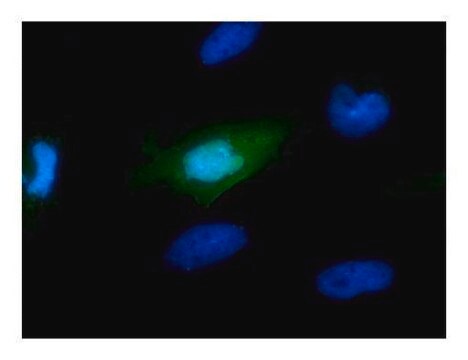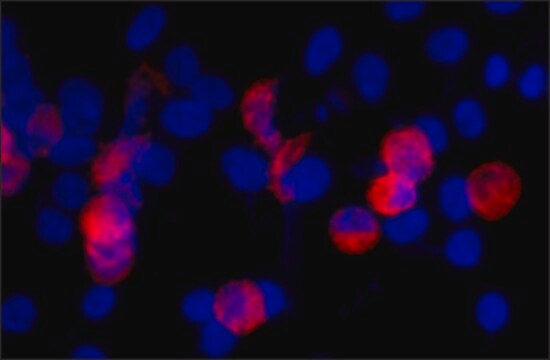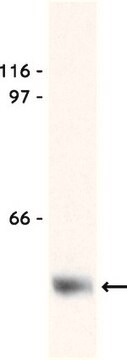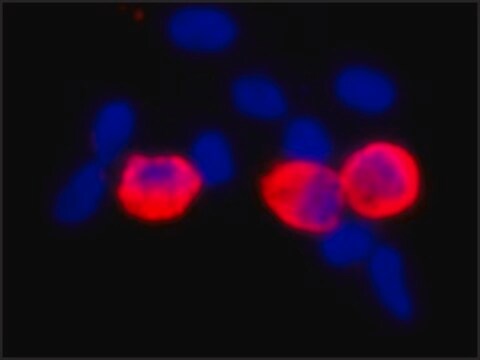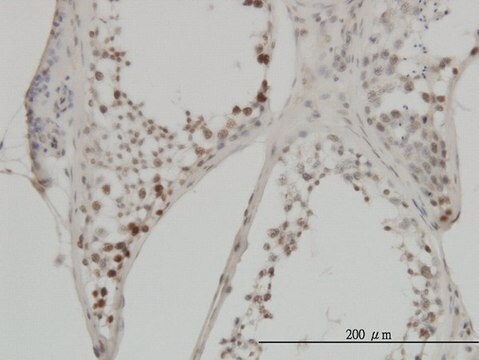SAB1305535
MONOCLONAL ANTI-MYC TAG antibody produced in mouse
clone 9E10, IgG fraction of antiserum, buffered aqueous solution
Synonym(s):
Tag from c-Myc protein
Sign Into View Organizational & Contract Pricing
All Photos(1)
About This Item
UNSPSC Code:
12352203
NACRES:
NA.43
Recommended Products
biological source
mouse
Quality Level
antibody form
IgG fraction of antiserum
antibody product type
primary antibodies
clone
9E10, monoclonal
form
buffered aqueous solution
technique(s)
western blot: 1:2,000
isotype
IgG1
shipped in
wet ice
storage temp.
−20°C
target post-translational modification
unmodified
General description
The cellular myelocytomatosis (c-myc) gene is mapped to human chromosome 8q24. It is the cellular homologue of the v-myc gene originally isolated from an avian myelocytomatosis virus. c-myc is a member of MYC gene family.c-Myc gene codes for basic helix-loop-helix/leucine zipper (bHLH/LZ) transcription factor that regulates the G1-S cell cycle transition.
Application
MONOCLONAL ANTI-MYC TAG antibody produced in mouse has been used in Western blotting.
Biochem/physiol Actions
The cellular myelocytomatosis (c-myc) oncogene plays a vital role in cellular proliferation, differentiation, apoptosis and acts as transcriptional regulator of gene expression. c-myc expression is essential and sufficient to assist most of the cells to enter DNA synthetic (S) phase of the cell cycle. The encoded protein plays a crucial role in vasculogenesis and angiogenesis during cancer development and progression. c-myc interacts with its binding partner Max and activates the transcription of growth promoting genes such as cyclin D2 and ornithine decarboxylase. It also represses the transcription of multiple genes, especially p21 and p27, by binding to the transcription initiator element (Inr) in a complex with Max and either Sp1 or Miz1. Overexpression of MYC in DLBCL (diffuse large B-cell lymphoma) results in poor outcome and invasive treatment when medicated with rituximab plus cyclophosphamide, doxorubicin, vincristine and prednisone (R-CHOP).
Physical form
Supplied in PBS with 0.09% (W/V) sodium azide
Disclaimer
Unless otherwise stated in our catalog or other company documentation accompanying the product(s), our products are intended for research use only and are not to be used for any other purpose, which includes but is not limited to, unauthorized commercial uses, in vitro diagnostic uses, ex vivo or in vivo therapeutic uses or any type of consumption or application to humans or animals.
Not finding the right product?
Try our Product Selector Tool.
recommended
Product No.
Description
Pricing
Storage Class Code
10 - Combustible liquids
Flash Point(F)
Not applicable
Flash Point(C)
Not applicable
Certificates of Analysis (COA)
Search for Certificates of Analysis (COA) by entering the products Lot/Batch Number. Lot and Batch Numbers can be found on a product’s label following the words ‘Lot’ or ‘Batch’.
Already Own This Product?
Find documentation for the products that you have recently purchased in the Document Library.
Customers Also Viewed
Long noncoding RNA MALAT1 promotes hepatic steatosis and insulin resistance by increasing nuclear SREBP-1c protein stability
Caifeng Yan, et al.
Scientific Reports (2016)
Over-expression of the c-myc proto-oncogene in colorectal carcinoma.
Smith DR, et al.
British Journal of Cancer, 68(2) (1993)
Zixing Li et al.
Proceedings of the National Academy of Sciences of the United States of America, 115(19), E4522-E4531 (2018-04-25)
Abscisic acid (ABA) plays essential roles in plant development and responses to environmental stress. ABA induces subcellular translocation and degradation of the guanine nucleotide exchange factor RopGEF1, thus facilitating ABA core signal transduction. However, the underlying mechanisms for ABA-triggered RopGEF1
MAPK signal pathways in the regulation of cell proliferation in mammalian cells.
Zhang W, et al.
Cell Research, 12(1), 9-18 (2002)
HIF-2alpha promotes hypoxic cell proliferation by enhancing c-myc transcriptional activity.
Gordan JD,et al.
Cancer Cell, 11(4), 335-347 (2007)
Our team of scientists has experience in all areas of research including Life Science, Material Science, Chemical Synthesis, Chromatography, Analytical and many others.
Contact Technical Service